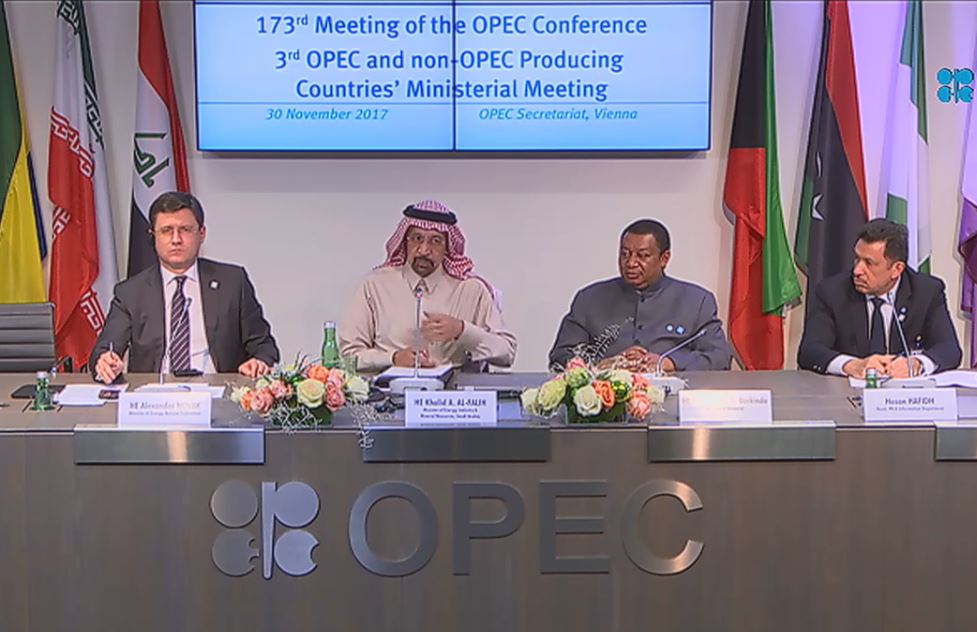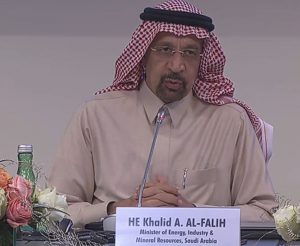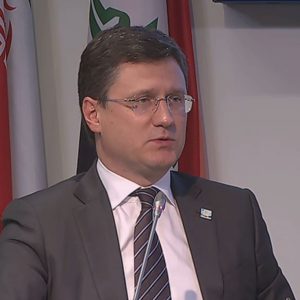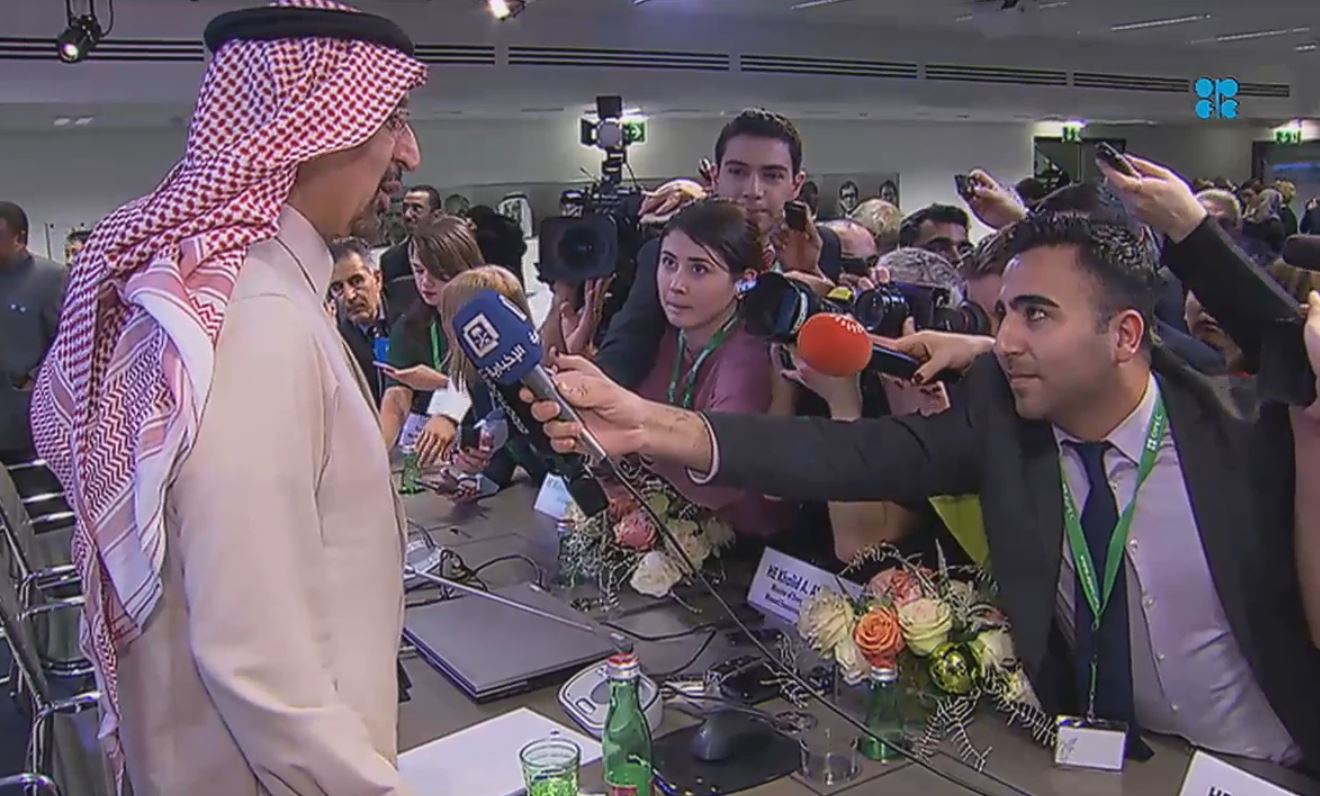We are in this for the long term: OPEC
Supply from the participating countries will be fully adhered to: “I’m going to be breathing down the necks of the other 24 countries, making sure that everybody stays the course” – Al-Falih
The contribution of shale in 2017 was “quite moderate” – Al-Falih
With the past couple of days of meetings involving 24 countries and six observing countries, OPEC wrapped its 173rd regular meeting and its 3rd OPEC and non-OPEC ministerial meeting in Vienna, announcing that the group would extend the present 2017 production cut program until the end of 2018, making an amendment that would date the agreement from Jan. 1, 2018 through Dec. 31, 2018.

OPEC press conference, Nov. 30, 2017
“I am pleased to announce that the decision has been unanimous. It’s a solid decision that many of you have been urging us to make which is to roll over and extend the deal through December of 2018,” Khalid A. Al-Falih, Saudi Arabia’ Minister of Energy, Industry & Mineral Resources said after the group returned from final deliberations.
“Supply from the participating countries will be fully adhered to,” Al-Falih said, “so we don’t expect supply surprises in 2018 the way we saw in 2017.”
“But supply from non-participating countries and regions remains a question mark and we acknowledge the potential variability especially from shale producers in the U.S.,” Al-Falih said in the press conference.

Khalid Al-Falih, Saudi Arabia
Al-Falih said the goal is to bring inventories down to their normal levels. He said the targeted inventory levels would be clearly defined by mid-year. He said it would be at least 150 MMBO below the current OECD levels.
Al-Falih said the group had a “close, friendly discussion” with the leadership of Libya and Nigeria. “Both countries have told us that their 2018 levels would not exceed what they were able to achieve in 2017.” Al-Falih said both Libya and Nigeria told OPEC that 2018 would not surprise to the upside.
Al-Falih pointed out that all 30 countries in Vienna today were committed to work together over the mid- to long term to continue to bring market stability, looking after the interest of both consumers and producers. “We learned in the previous two to three years that low oil prices are equally damaging to the global economy, just as unreasonably high oil prices are,” Al-Falih said, explaining the consumer reference.
Our 2018 outlook is very bullish
“Our 2018 outlook is very, very bullish, and there is no reason for me to expect it to slow down dramatically. … A number of member countries have told us their natural decline will actually exceed the [production cut] number they have signed up to,” he said.
“We in Saudi Arabia are committed,” Al-Falih said. “We have taken it on ourselves to lead by example, to be a catalyst for the success of these declarations. … There is every reason to expect me and my country to replicate our level of commitment in 2018 as we have done in 2017.”
He closed his comments by saying, “I’m going to be breathing down the necks of the other 24 countries, making sure that everybody stays the course.”
While finalizing his opening remarks, before Al-Falih turned the microphone over to his Russian counterpart Alexander Novak, who spoke in Russian through an interpreter during the press conference, Al-Falih said, “we have been united shoulder to shoulder, we talk a lot whether it’s in person to person meetings or over the phone.”
With 30 countries in participation and much made of the growing number of participants, there were only two speaking countries in the hour-long press conference–Saudi Arabia and Russia.

Alexander Novak, Russia
Novak said, “I think we have reaffirmed our commitment to reaching the goal of bringing the inventory overhang back down to the five-year average level, which would help in restoring a healthy supply and demand balance in a healthy market.”
“Not to limit our cooperation to just this declaration, I would like to mirror my friend and colleague Mr. Al-Falih in saying that the relationship between Russia and Saudi Arabia is developing faster than ever and it’s not just in the energy space. We are looking at many sectors and making progress there.”
After Novak’s opening comments, media questions followed.
Answering a question as to setting the market price for oil, Al-Falih said, “Prices are not to be determined by political decisions. They are very much to be determined by markets and they will oscillate and finally they will find a balance that brings supply and demand into balance. We have seen that when prices were too high, supply exceeded demand, and if prices are too low as they have been the last couple of years you can easily project that supply will be short in a few years as the decline takes place and demand rises very fast. What is the range that will bring that balance? We will discover that in the next few years.”
“I’m not the one who decides and certainly I don’t know where the price is going to be; the markets will decide where the price is going to be.”
CNN: “If there is one danger in this one year agreement is that you can see a price rise which invites other non-participating, non-OPEC countries to boost production, how agile will be if that’s the case?”
As-Falih: “Like I said to the previous question, we will leave prices to the markets to manage and control. … I think you allude in your question to the issue of shale because this has been written about and talked about extensively. … My view and that of my country, we believe shale contributions are a fact that they have contributed to global supply and their incremental growth is also a fact, but growth in demand of 1.5 MMBO year after year after year, with 3 to 4 to 5 million barrels annually of decline from mature basins.
“We’re seeing it in the North Sea, in Mexico, in China, we’re seeing it even in many OPEC producing countries—that decline year after year needs to be offset, and we don’t believe shale can nearly carry that load. So how much does it contribute? I don’t think we should over-react based on one year. There was a lot of fear mongering about shale in 2017, and we’ve seen that not happening.
“I think the contribution of shale in 2017 was … quite moderate. My expectation is that 2018 will not be significantly different than 2017. Yes, there is going to be more drilling and perhaps more completions but then you have higher declines as the base of shale increases. We will monitor it. But I think we have to be focused on the big picture: 1.5 million barrels of demand year after year after year, almost three years in a row and the same forecast for next year.
“We will wait and see how that unfolds and we will adjust but we’re not going to be quick on the trigger based on monthly, weekly and quarterly results. We want to see longer sustainable trends from shale before reacting.”
Bloomberg: “Regarding the June meeting, what kind of production, what kind of parameters will you be looking at? Have you started to have a discussion about the exit strategy from the agreement?”
Al-Falih: “The metrics for the review in June are … supply, demand and inventories. They are not going to change. If one of the variables diverts significantly from where we think it is going to be and a different set of interventions are needed, we will consider them. I think the countries who are signatories to the agreement have tasted success and they want to continue to work together.
“OPEC has considerable spare capacity. Our spare capacity has been maintained in Saudi Arabia despite the limits on production. If you look at drilling levels in Saudi Arabia they have not been reduced.
“I think all in all the market should be rebalancing at a fast clip in 2018. … On January 1, I assure you that you are not going to see 1.8 million barrels released into the market. We just haven’t decided how the gradual easing of supply is going to be. We have to see realistically who has spare capacity.
“We’re not in this for the short term, we’re in this for the long term. We think the more countries we bring in the better. And we want companies to also join—global companies, national companies—we want them to see this is beneficial for all.”
And what about the Aramco IPO?
Al-Falih: What I can tell you is the government is on track, the company is on track to getting the IPO done in 2018. My advice is ‘stay tuned’ – you will get the news when we’re ready to release it.

OPEC press conference, Nov. 30, 2017

